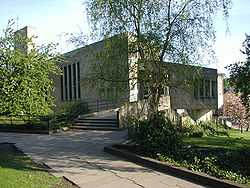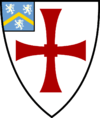Durham Students' Union
Coordinates: 54°46′24″N 1°34′18″W / 54.77333°N 1.57167°W
 | |
| Institution | Durham University |
|---|---|
| Location | Dunelm House, Durham, United Kingdom |
| Established | 1899 as Durham Students Representative Council |
| President | Daniel Slavin |
| Sabbatical officers | Academic Affairs Officer: David Morris; Activities Officer: Krystina Warrington; Community Officer: Grace Abel; Development Officer: Chris Pocock. |
| Trustees | Daniel Slavin, Grace Abel, Krystina Warrington, Chris Pocock, David Morris (sabbatical trustees), Natalie Clifton, Ollie Dixon, Cole Sims, David Murphy (student trustees), Rob George, Ray Hudson, Rudolph Stewart, Dianne Sharp (co-opted trustees) |
| Members | c. 16,500 |
| Affiliations | National Union of Students, |
| Website | Durham Students' Union homepage |
Durham Students' Union is a body, set up as the Durham Colleges Students’ Representative Council in 1899 and renamed in 1969, with the intention of representing and providing welfare and services for the students of the University of Durham in England.
Location

The Union occupies and manages Dunelm House, a university-owned building in the centre of Durham where a wide variety of student activities take place. Designed by Architects Co-Partnership, the Brutalist, angular concrete building was completed in 1965 under the supervision of architect Sir Ove Arup, whose Kingsgate Bridge, adjacent, opened two years earlier. Built into the steeply sloping bank of the River Wear, Dunelm House is notable internally for the fact that the main staircase linking all five levels of the building runs in an entirely straight line. This was intended by the building's architects to create the feeling of an interior street.[1]
In 1968 Dunelm House won a Civic Trust award,[2] though the architecture of Dunelm House is not generally well liked in the city[citation needed]. On the other hand, Sir Nikolaus Pevsner, the noted architecture historian, considered the building, "Brutalist by tradition but not brutal to the landscape ... the elements, though bold, [are] sensitively composed."[1] Durham City Council's Local Plan notes that the "powerful" building, together with Kingsgate Bridge, "provides an exhilarating pedestrian route ... out into open space over the river gorge".[3]
Services
Welfare
The union provides a number of student welfare services, in addition to those provided by the University. To that end, it employs full-time trained advisors who work in the Advice Centre, runs the Nightbus that ensures students can get home safely and organises "associations" for specific minority groups of students whose interests are deemed to require additional non-collegiate provision.
Social events
During the late 1960s and the 1970s Dunelm House was a popular music venue, hosting bands including Pink Floyd, Wishbone Ash and Procol Harum. According to their drummer Simon Kirke, Free's most popular song All Right Now was written by bassist Andy Fraser and singer Paul Rodgers in their dressing room in Dunelm House, after a set of slower material had failed to excite the audience.[4]
The Union often struggles to match the Durham colleges' abilities to organise 'ents' and socials. However, it runs the successful 'Planet of Sound' club night every Friday, which has become the biggest university-wide event in Durham. The Union has had some success in the year 2006/07 with hosting events with promoters, including nights with acts such as Hed Kandi and Pendulum. It also organises the annual Freshers' Ball and Freshers' Bop early in the first term.
Societies
Durham Students' Union is notable for the high number of ratified societies it supports. There are usually approximately 170 registered societies at any time. A full and up-to-date list of the Union's societies can be found on the Durham Students' Union website. These societies do not include the University's assorted athletic- and sports-related clubs which are ratified by Union's "sister" organisation, the Durham University Athletic Union (DUAU), or college-based societies.
DUCK
Unlike many students' unions, Durham Students' Union does not have "RAG week", but instead, DUCK - Durham University Charities' Kommittee - organises charitable events and activities throughout the year.
A story recently discovered in the Union archive relates that in 1978 DUCK held a competition to find the most unpopular student in Durham with the intention of throwing them in the river. At the time the story went to print the student officers were the front runners[citation needed].
DUCK was formed in the 1960s to raise money for local, national and international charities. It runs a number of expeditions to destinations including India, Kilimanjaro and Jordan.
Politics
Durham Students' Union has succeeded in having a say in national student politics. In 2004 a campaign run by the Union appeared on BBC, ITV and Channel 4 News numerous times throughout the debate over variable tuition charges. A huge number of regional and local TV and radio appearances for Union officers were secured over that period. During this time, the Union won praise from politicians, many within NUS and other Unions in the North-East for its uncharacteristically high-profile impact on the national debate on University funding.
Relation to colleges
Durham University is a collegiate university and therefore the role of the central students' union is different from most other universities. Each of Durham's colleges has its own student representative body, known in most colleges as the Junior Common Room, which provides services and organises events within the college; while most decisions within the central Students' Union are made by JCR Senior Durham SU representatives. This gives the Union an avenue for encouraging involvement not available to unions in most universities; but also limits participation, as many people choose to get involved with their JCR, which deals with many of the issues with immediate effects on their lives, instead of the central Union.
Future
The announcement in early 2005 that the Union had been operating with a large annual loss has prompted serious debate on the future of the organisation and the building in which it is currently based. According to Durham's student newspaper, Palatinate, the Union's debt to the bank and its parent institution stood at £303,000 in June 2005. Restructuring of the organisation followed and resulted in a small surplus being posted for the year 2005/06. In 2007/08 a reorganisation took place, which resulted in the adoption of a new constitution. Governance of the Union was also updated with the introduction of a Board of Trustees consisting of the four student officers, four elected student trustees and four co-opted trustees.
On a number of occasions, some have suggested have that the Union might disaffiliate from the NUS,[5] however until last year none of those against affiliation have yet pushed the issue to a full student debate and vote. In 2009 however, a referendum took place proposing that the Union should stay affiliated to the NUS. Students voted convincingly in favour of affiliation with 80% (2564) of students voting to stay affiliated and 20% (624) voting to disaffiliate.[6]
Recent controversy regarding a planned debate, "Multiculturalism in Britain", which was to involve representatives of the BNP and which was subsequently cancelled over fears for student safety, has reopened the issue of NUS affiliation. A petition for a second referendum was put before the Union [7] and on 12 March 2010, the referendum concluded with a majority of voting students having voted to disaffiliate from the NUS.[8] the Union will no longer be affiliated with the NUS after the end of the 2009-2010 academic year.[9]
A third referendum on NUS affiliation was held in January 2011 with 60% of students voting to reaffiliate with NUS.[10]
Notable former officers
A number of notable figures have been involved in Durham Students' Union in the past. These include:
- Mo Mowlam, former Deputy President (Education and Welfare)
- Jeremy Vine, former Editor of Palatinate
- George Alagiah, former Editor of Palatinate
References
- ↑ 1.0 1.1 Pevsner, Nikolaus, The Buildings of England: County Durham (2nd ed. 1983, revised by Elizabeth Williamson), Harmondsworth, Middlesex: Penguin Books Ltd, pp.233-234
- ↑ Architects Co-Partnership, "Awards and Commendations", accessed 28 October 2006
- ↑ Durham City Council, City of Durham Local Plan, accessed 5 November 2006
- ↑ Mckay, Neil (5 November 2008). "All Right Now for Free tribute show". The Journal (Newcastle).
- ↑ Hannah Costigan, "Durham to pull out of NUS", Palatinate, accessed 28 October 2006
- ↑ DeVote online voting system, accessed 27 November 2009
- ↑ Vincent McAviney & Jodie Smith, "Security concerns stifle free speech", Palatinate, accessed 8 February 2010
- ↑ http://vote.dsu.org.uk/index.cgi/results/51 DeVote online voting - Results
- ↑ Ben Robertson,"NUS Referendum Results Announced"
- ↑ DeVote Online Voting
External links
- Durham Students' Union
- DUCK Home page
- Photograph of Dunelm House in 1965 from Architects Co-Partnership
| |||||||||||||||||||||||
